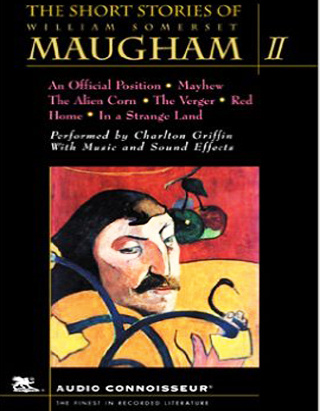

He had been wild, thoughtless, and selfish, but he had never before done anything dishonest, by which George meant illegal and if he were prosecuted he would assuredly be convicted. He went into the whole discreditable affair. Tom said that to serve in a bar or to drive a taxi was a perfectly decent occupation, but if George could oblige him with a couple of hundred pounds he didn't mind for the honour of the family giving it up. It was not very nice for a respectable lawyer to find his brother shaking cocktails behind the bar of his favourite restaurant or to see him waiting on the box-seat of a taxi outside his club. But when circumstances forced George to realize that his brother would never settle down and he washed his hands of him, Tom, without a qualm, began to blackmail him.

On these Tom bought a motor-car and some very nice jewellery. Once or twice he fell to Tom's promises of amendment and gave him considerable sums in order that he might make a fresh start. George was a serious man and insensible to such enticements. For this he depended on his brother George. But he always said that the money you spent on necessities was boring the money that was amusing to spend was the money you spent on luxuries. He made a steady income from his friends and he made friends easily. I have never met anyone to whom it was more difficult to refuse a loan. They shook their heads and asked what would happen when his money was spent. Rumours of his doings reached his relations from time to time and they were profoundly shocked. He had a little money and he spent two happy years in the various capitals of Europe. But one day, without warning, he announced that he didn't like work and that he wasn't suited for marriage.

The Ramsays were perfectly respectable people and there was every reason to suppose that Tom Ramsay would have a useful and honourable career. He had begun life decently enough: he went into business, married, and had two children.
SOMERSET MAUGHAM SHORT STORIES PDF TRIAL
Tom had been a sore trial to his for twenty years.

I suppose every family has a black sheep. You must know by now that he's quite hopeless.' 'Why don't you chuck him? You've done everything in the world for him. 'I'm not in hilarious spirits,' he answered. I was sorry for him: I suspected at once that his unfortunate brother had been causing trouble again. He looked as though the burden of the whole world sat on his shoulders. I never saw anyone wear an expression of such deep gloom. I could not help thinking of this fable when the other day I saw George Ramsay lunching by himself in a restaurant. In this summary (and as I have discovered since, entirely human) fashion I sought to express my disapproval of prudence and common sense. My sympathies were with the grasshopper and for some time I never saw an ant without putting my foot on it. I do not ascribe it to perversity on my part, but rather to the inconsequence of childhood, which is deficient in moral sense, that I could never quite reconcile myself to the lesson. 'Saving your presence, I sang, I sang all day, all night.' 'What were you doing in the summer time?' Then the ant gives him her classic answer: Winter comes and the ant is comfortably provided for, but the grasshopper has an empty larder: he goes to the ant and begs for a little food. In this admirable fable (I apologize for telling something which everyone is politely, but inexactly, supposed to know) the ant spends a laborious summer gathering its winter store, while the grasshopper sits on a blade of grass singing to the sun. Among those I learnt was The Ant and The Grasshopper, which is devised to bring home to the young the useful lesson that in an imperfect world industry is rewarded and giddiness punished. When I was a very small boy I was made to learn by heart certain of the fables of La Fontaine, and the moral of each was carefully explained to me.


 0 kommentar(er)
0 kommentar(er)
